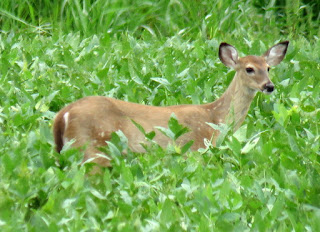September 9
We saw 16 deer over the course of our day here. We saw a
couple of does with fawns and one doe had twins. Then 8 to 10 of them ran across one of
the fields white tails in the air. We also saw quite a few birds including
Cardinals, Chickadees, Yellow-billed Cuckoos, lots of wrens that we could never
see, Vireos, Flycatchers, Orioles and sparrows. We also saw 3 different Hawks
and some Wood Ducks. We also came across a cute little turtle along side the
road.
On the boat ramp on the way down to Lodge Lake we saw a lot
of butterflies all together. Lots of Great Egrets and a Great Blue Heron. We
also saw a Cottonmouth swimming quite close to where we were before it turned
and went away from us and it followed the shoreline away from us.
White-tailed Deer
there were quite a few Blue-grey Nuthatches
young Red-bellied Woodpecker
Great Crested Flycatcher
Great Egret
immature Indigo Bunting
Bells's Vireo
Eastern Musk Turtle?
We stopped in the middle of the day for lunch and we stopped
at Mexican restaurant and I have to say it was not only the worst Mexican food
of the trip, it was the worst food of the trip. Despite it being run by real
Mexicans, I can only think that they make it boring for the Arkansans as I have
never tasted anything that odd. The enchiladas were not cooked, but this ground
mushy meat was rolled in a corn tortilla like a burrito and then covered with a
cheese sauce. Not baked together, it was just assembled & served. The taco had the same meat as did Greg’s relleno which was the
size of a 50 cent piece and equally not tasty. I asked for some enchilada sauce
for my enchiladas and I have had canned sauce with more flavor. Ah well, can’t
win ‘em all. The place was packed so the locals love it. (never a good sign
when there aren’t any Latinos eating there)
We went back and drove around the rest of the huge Refuge.
Yellow-billed Cuckoo
butterfly sat on the car window
immature Red-tailed Hawk
butterflies on the boat ramp
Lodge Lake
Cottonmouth in the lake
Cottonmouth in the lake
Cottonmouth in the lake - far away at this point along the shoreline
Great Egrets
turtle on a log
Arkansas River
One area had a raised platform to look out over the river and it had a plaque
explaining the Trail of Tears. They came through this particular area on the way to Oklahoma during the winter of 1838-1839. Various Cherokee, Creeks, Chickasaws, Choctaws, and Seminoles were forcibly moved
through this area at other times during the 1830s and 1840s.
From the Trail of Tears website: "In the 1830s, the U.S. government forced tens of thousands of
Cherokee, Choctaw, Chickasaw, Seminole and Muskogee tribespeople to move
hundreds of miles west from their ancestral homes in the Southeast to
present-day Oklahoma. Members of those tribes traveled by foot, horse, wagon,
railroad or steamboat along various routes, some of which are now designated as
the Trail of Tears National Historic Trail. The network of trails stretches
across 5,043 miles in nine states. Many of the native people died along the
way.
The loss of family,
land and culture for each of the affected tribes is incalculable. The pain and
grief still echoes throughout Indian Country. Remembering and accurately
portraying the history surrounding the Trail of Tears and the cost to the
tribes is a start toward healing.”
No wonder there were so many Casinos on “reservation” land
in Oklahoma.
I remember
growing up in Iowa and the AM Rock station in Little Rock had such a strong signal that it was the only thing that came in late at night after all the rest of the stations went off the air or got too much static to listen to. It was KAAY, The Mighty 1090 and they had a show called Beaker Street and it was a way to hear "all of the long-haired, weird music" that was coming in from the west
coast. Before the internet and many TV stations, both coasts got all the new stuff and it took a while to filter into the Midwest. It was normally out of style before we got it.
In its heyday during the 1960s and '70s, KAAY-AM 1090 played
top 40 music during the day and progressive rock at night. With a powerful
signal that reached most of Arkansas during the day, at night KAAY's secondary
pattern reached much of the U.S., as well as other counties including Cuba.
Because the signal could be heard clearly in Cuba at night,
toward the end of the Bay of Pigs crisis in October 1962, the U.S. government
used KAAY to broadcast propaganda directly to the Cuban people. At that time
the U.S. was working to secure the release of more than 1,100 Cuban exiles who
had been part of a invasion force that failed to overthrow Cuban leader Fidel
Castro.
Anyway, we had a great day at the Wildlife Refuge.
Tomorrow, the car goes in to see if this local guy can fix it so we can tow it instead of me driving me behind the coach.






















































Too bad the food sucked, the deer photos and other animal shots are really nice, it is a really green and lush place.
ReplyDelete